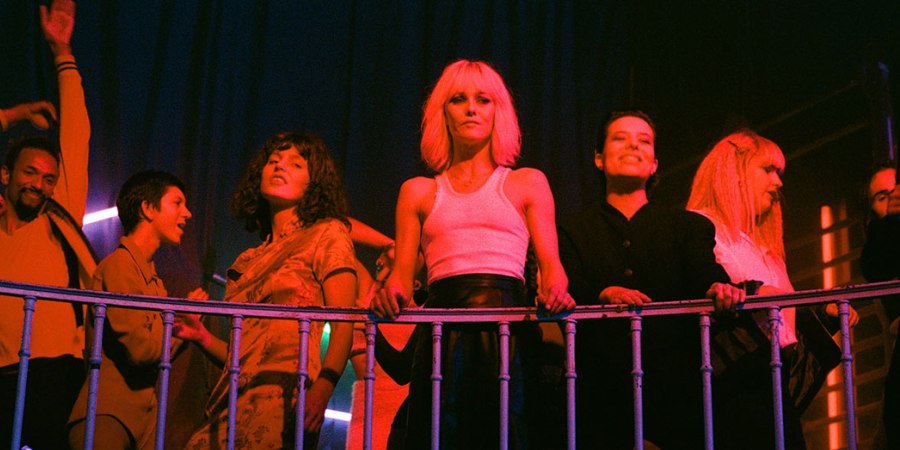Knife+Heart is the second Giallo throwback released in as many weeks, following Peter Strickland’s In Fabric, such is the state of the art house in 2019, with its increasing interest in genre filmmaking. But unlike Strickland’s smugly detached, close to insincere stylishness, Yann Gonzalez’s film is much more heart felt.
This balancing act between genre thrills and genuine humanity is held together by Vanessa Paradis’ terrific performance as Anne Parèze, the ambitious porn producer / director at the centre of a series of strange murders. There’s a wonderfully warm gay-lesbian relationship between her and Thierry (Félix Maritaud), a relationship between a man and a woman with no tension of intimacy leading to something more, something sexual or romantic. It’s a delightfully tender kind of relationship that’s seldom seen in the movies, climaxing beautifully with gentle smiles in the mid-credits scene (yes, really).
But it’s not all kindness and warmth, Anne very much has a darkness to her, especially in relation to her ex, the editor in their porn studio, Loïs (Kate Moran). To win her back, Anne tries to impress Loïs with porn based off of these grisly murders happening all around them (the two amusingly titled, Homo-cidal and Hex Rated), pulling her out of the mundanity of editing the same, old same old.
This obsession leads to a deeply uncomfortable scene where Anne sexual abuses Loïs, erratically grabbing her breasts and fingering her, screaming ‘This is mine! This is mine!’ Perhaps it’s so disquieting because it shows something seen today as one-dimensionally evil, in a shockingly nuanced, and almost understandable way. We don’t condone Anne’s action, but we sympathise with them. Another delicate balance the film pulls off cannily.
That nuance is extended into Anne’s artistic drives, creating art, as porn is pretty flatly presented to be with a stranger telling Anne how much her movies affected him, from your own suffering, even when it involves others is a long understood idea. But it’s none the less difficult considering her seeming detachment, often wearing sunglasses, cooly detached, not showing that pain in front of the crew.
But of course, underneath that is a deep emotional suffering, as is shown in a heartrendingly quiet palm reading scene. Anne’s opening up represents the films fundamental difference from Strickland’s film, and perhaps the genre as a whole, an opening of the heart.
Moving from the ‘Heart’ to the ‘Knife’, there are some truly glorious killing scenes, the first probably being the strongest, as an actor is seduced by the gimp-mask wearing killer, and fucked to death, a blade extending from a large black dildo. Intercut with Loïs editing, literally cuts on top of cuts, creating both a flashy and visceral kill, and drawing an interesting connection between death and sex, between orgasm and murder.
The other killing scenes don’t quite reach that height, but are all committedly stylish, in one the camera spins around, only slightly slowing to see the killer approaching another actor from behind. And one where the lights flick on and off, continuing after the killer flees, leading into another moment of great visual power, the flickering in and out consciousness of a dying character.
But the film takes no pleasure in these gay deaths, the killer isn’t some ‘force from God’ coming down to punish the sodomisers, as the AID’s epidemic (which the film, set a few years prior to, never mentions or implies) was often framed to be. In fact the killer is stopped fairly anti-climactically in a moment of union and solidarity, again, the Knife and the Heart.
Perhaps the connection drawn between sex, death and movies isn’t fully developed, indeed they are confounding, and when expressed so gorgeously, so emotionally, they very much feel right, but I’m not sure why. The movie never manages to get underneath that. But none the less, Yann Gonzalez’s Knife+Heart delivers a film with as deep an understand of genre thrills, as of the human heart, creating something deeply loving, and deeply gay.

